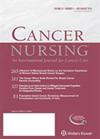宫颈癌患者体弱对化疗毒性反应的影响:一项纵向研究
IF 2.4
3区 医学
Q1 NURSING
引用次数: 0
摘要
背景关于虚弱对宫颈癌患者化疗毒性影响的纵向研究十分有限。目的探讨虚弱对宫颈癌患者化疗毒性的影响。方法在 2020 年 7 月至 2021 年 12 月期间招募了 259 名来自中国西北某医院的宫颈癌术后患者。参与研究的患者在术后接受了 4 个化疗周期的随访。虚弱程度采用蒂尔堡虚弱指标进行测量。化疗毒性反应采用《不良事件通用术语标准4.0》进行评估。结果Cox回归分析表明,虚弱可作为总毒性的独立风险因素(危险比[HR],5.423;95% 置信区间 [CI],3.260-9.023;P < .001)、恶心(HR,3.967;95% CI,2.446-6.433;P < .001)和呕吐(HR,3.081;95% CI,1.921-4.942;P < .001)的独立危险因素。重复测量方差分析显示,体弱组的白细胞值低于非体弱组(Fgroup effect = 4.172,P = .043),体弱组的血红蛋白值低于非体弱组(Fgroup effect = 6.589,P = .012)。虚弱可降低宫颈癌术后辅助化疗患者的白细胞和血红蛋白值。本文章由计算机程序翻译,如有差异,请以英文原文为准。
The Impact of Frailty on the Toxic Reaction of Chemotherapy in Patients With Cervical Cancer: A Longitudinal Study.
BACKGROUND
Longitudinal research on the impact of frailty on chemotherapy toxicity in patients with cervical cancer is limited.
OBJECTIVES
To explore the impact of frailty on chemotherapy toxicity in patients with cervical cancer.
METHODS
Two hundred fifty-nine postoperative cervical cancer patients from a hospital located in Northwest China were enrolled between July 2020 and December 2021. Participating patients were followed up for 4 chemotherapy cycles after surgery. Frailty was measured using the Tilburg Frailty Indicator. Chemotherapy toxic reactions were evaluated using the Common Terminology Criteria for Adverse Events 4.0. Repeated-measures analysis of variance and Cox regression analysis were used to analyze the effect of frailty on chemotherapy toxicity.
RESULTS
Cox regression analysis showed that frailty could serve as an independent risk factor for total toxicity (hazard ratio [HR], 5.423; 95% confidence interval [CI], 3.260-9.023; P < .001), nausea (HR, 3.967; 95% CI, 2.446-6.433; P < .001), and vomiting (HR, 3.081; 95% CI, 1.921-4.942; P < .001). Repeated-measures analysis of variance showed that the white blood cell values of the frail group were lower than those of the nonfrail group (Fgroup effect = 4.172, P = .043), and the hemoglobin values of the frail group were lower than those of the nonfrail group (Fgroup effect = 6.589, P = .012).
CONCLUSIONS
Frailty can increase the risk of total chemotherapy toxicity, nausea, and vomiting. Frailty can reduce the white blood cell and hemoglobin values of postoperative adjuvant chemotherapy cervical cancer patients.
IMPLICATIONS FOR PRACTICE
Findings may assist healthcare providers in taking effective measures to reduce the toxicity of chemotherapy.
求助全文
通过发布文献求助,成功后即可免费获取论文全文。
去求助
来源期刊

Cancer Nursing
医学-护理
CiteScore
4.80
自引率
3.80%
发文量
244
审稿时长
6-12 weeks
期刊介绍:
Each bimonthly issue of Cancer Nursing™ addresses the whole spectrum of problems arising in the care and support of cancer patients--prevention and early detection, geriatric and pediatric cancer nursing, medical and surgical oncology, ambulatory care, nutritional support, psychosocial aspects of cancer, patient responses to all treatment modalities, and specific nursing interventions. The journal offers unparalleled coverage of cancer care delivery practices worldwide, as well as groundbreaking research findings and their practical applications.
 求助内容:
求助内容: 应助结果提醒方式:
应助结果提醒方式:


